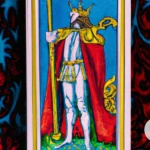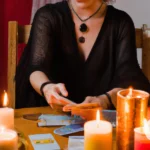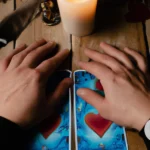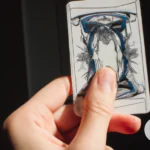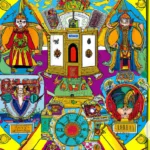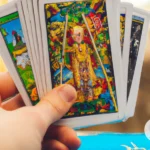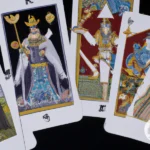As we delve deeper into the magical realm of tarot, we are often bewildered by the complex meanings and interpretations of the court cards. These enigmatic figures, representing individuals of different personalities and traits, can be the most challenging to comprehend in a tarot reading. However, understanding the personality traits of these court cards can significantly enhance the accuracy and depth of your readings. In this article, we will explore the basics of court cards, delve into the different suits and meanings, and analyze the distinct personalities of pages, knights, queens, and kings. We will share practical insights on how to interpret these court cards in a reading. So, let’s put on our divination hats and uncover the secrets of these courtly figures in tarot.
The Basics of Court Cards
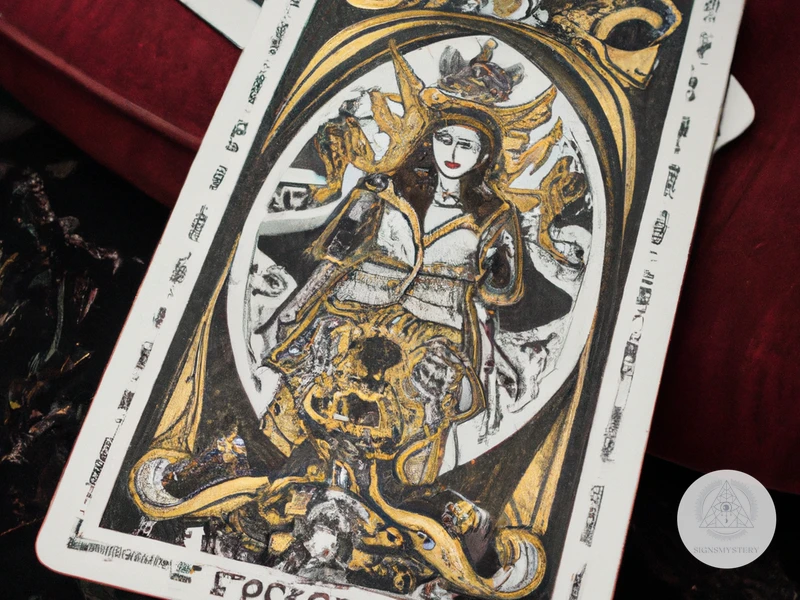
When delving into the world of tarot, Court Cards may seem like a perplexing aspect to understand. Represented by royalty and their courtiers, the Court Cards play a significant role in a tarot deck, reflecting specific personalities and behaviors. To help you comprehend the basics of Court Cards and their symbolic meanings, we have put together a comprehensive guide that covers everything you need to know to get a full understanding of these cards. From diving into the different suits to understanding each Court Card’s personalities, this guide will help you decode the mysteries of the Court Cards in tarot. Keep reading to learn more.
If you’re interested in learning how to incorporate Court Cards into tarot spreads, check out our guide on Court Cards in tarot spreads.
Understanding Court Cards
Court cards can be one of the most perplexing aspects of Tarot reading. They are typically represented by images of characters and eschew the numbered, pip system of the minor Arcana. Understanding them can be difficult, especially when just starting out with Tarot.
Firstly, it is important to recognize that court cards are not just people, but also represent behaviors and personalities. They can indicate things such as decision-making or communication styles, approaches to relationships or work, and even physical appearances. The titles and symbolism of court cards play an important role in this – the Knight of Cups, for example, is often associated with a romantic, emotionally driven type of person, while the Queen of Swords might represent someone who is analytical and tactical.
Another important aspect of understanding court cards is the relationship between the card and the reader or querent. The court card can represent the personality or behavior of someone in the querent’s life, or could represent an aspect of the querent themselves. A reader should pay close attention to the details of the card and consider how they relate to the question or issue being explored. For example, if the reader pulls the Page of Wands when asking about a work project, it may indicate a need for enthusiasm and creative thinking.
To understand court cards better, it can be helpful to memorize their meanings. This means becoming familiar with each card and its associated behaviors, personalities, and titles. Some readers find it helpful to associate each court card with a specific person they know or know of, in order to better remember their characteristics.
It is also important to remember that the court cards can be reversed, which can change or amplify their meanings. In some cases, a reversed court card can indicate a negative aspect of the personality or behavior it represents. For example, a reversed Queen of Cups may indicate emotional manipulation or instability.
Understanding court cards is important for a successful Tarot reading. Recognizing the different suits, titles and symbolism can help you better interpret the behavior and personality traits that the cards represent, while considering the relationship between the cards and the querent can help pinpoint what issues or questions are being addressed.
The Different Suits and Meanings
Court cards are an essential part of Tarot, and each suit has its own unique meanings and symbolism. The different suits – Cups, Swords, Wands, and Pentacles – each represent different aspects of life and personality traits. Understanding these identities can help you interpret the meanings of the court cards in a reading.
Cups: Cups represent emotions, intuition, and matters of the heart. It is associated with the element of water, which symbolizes fluidity and flexibility. The court cards of Cups are typically associated with emotional intelligence, creativity, and an ability to connect with others on a deep level.
Swords: Swords represent the mind, intellect, and rationality. They are associated with conflict, change, and decision-making. The element of Swords is air, symbolizing swift and sudden changes. The court cards of Swords are typically associated with analytical thinking, intellectual prowess, and the ability to make difficult decisions.
Wands: Wands represent creativity, inspiration, and the power of the will. It is associated with the element of fire, which symbolizes passion and transformation. The court cards of Wands are typically associated with creative vision, leadership, and the ability to inspire others.
Pentacles: Pentacles represent finance, material possessions, and the grounding force of nature. It is associated with the element of earth, which symbolizes stability and endurance. The court cards of Pentacles are typically associated with practicality, prosperity, and the ability to manifest abundance in one’s life.
Understanding the different suits and the meanings behind them can help you better interpret the court cards in a reading. By associating the traits of the court cards with their associated suits, you can form a more complete understanding of the personalities and behaviors they represent.
If you want to know more about the symbolism of Tarot court cards, you can follow this link to read our article on Tarot court card titles and symbolism. You can also follow this link to learn more about how to memorize court card meanings in Tarot in our article on memorizing court card meanings in Tarot.
Court Card Personalities
As we delve deeper into the world of Court Cards in Tarot, one may start to wonder about the personality traits and behaviors associated with each of these powerful cards. Each Court Card has its own unique personality and symbolism, allowing them to represent various individuals or aspects of a person’s life. Understanding the personalities of these cards can give us insight into ourselves and those around us. In the following sections, we will take a closer look at the Pages, Knights, Queens, and Kings of the Tarot deck, uncovering their traits and meanings. By the end of this article, you will have a deeper understanding of the Court Cards and how they relate to the world around us. If you are interested in learning about the relationship between Court Cards and personal dynamics you can check our previous article on the topic. For a closer look at reversed Court Cards, check out our article here.
The Pages
In Tarot, the Pages are often associated with youth, curiosity, and new ideas. These Court Cards are represented by individuals who are in the learning phase of their lives and are often still figuring out their place in the world. They might be students, apprentices, or young professionals just starting out in their careers. The Pages represent a feeling of potential energy, as these individuals are full of ideas and passion but might lack the experience or resources to fully implement them.
There are four Pages in a Tarot deck, each corresponding to a different suit: Cups, Pentacles, Swords, and Wands. The Page of Cups is often associated with emotional creativity, intuition, and sensitivity. They might be artists or musicians who are still developing their craft, or they might be individuals who are highly empathetic and emotional. In a reading, this card can represent emotional growth or a need for emotional healing.
The Page of Pentacles is often associated with material wealth, learning, and practicality. These individuals might be students, entrepreneurs, or young professionals who are focused on building their careers and accumulating resources. In a reading, this card can represent financial opportunities or a need to focus on practical matters like budgeting and planning.
The Page of Swords is often associated with mental agility, communication, and intellect. These individuals might be writers, speakers, or entrepreneurs who are focused on intellectual pursuits. They might also embody the qualities of a detective or investigator, always seeking the truth and gathering information. In a reading, this card can represent a need to speak up for oneself or to gather more information before making a decision.
Finally, the Page of Wands is often associated with inspiration, creativity, and adventure. These individuals might be artists, travelers, or entrepreneurs who are inspired by new ideas and experiences. They might also embody the qualities of a leader, always inspiring others to take risks and follow their passions. In a reading, this card can represent new beginnings or a need for creative inspiration.
The Pages represent individuals who are still learning and growing, but who have the potential for great things. They might be full of ideas, but not yet have the experience or resources to fully realize them. To learn more about the behavior and personality traits of Court Cards, read our article Understanding the Personality Traits of Court Cards in Tarot.
The Knights
When it comes to the Knights in court cards, they are all about action and movement. Each Knight has a specific personality that can be interpreted in a reading. Here is a breakdown of each Knight and what they represent:
| Knight of Wands | Knight of Cups | Knight of Swords | Knight of Pentacles |
|---|---|---|---|
| The Knight of Wands is a passionate and impulsive person. They are full of energy and always on the move. This Knight is all about taking risks and following their dreams. They may not always think before they act, but their enthusiasm will often lead them to success. | The Knight of Cups is a romantic and emotional person. They are in touch with their feelings and often have a creative side. This Knight is all about love and forming deep connections with others. They may be a bit idealistic, but their sensitivity can be a real strength. | The Knight of Swords is an intelligent and strategic person. They are quick-witted and always up for a challenge. This Knight is all about logic and using their intellect to solve problems. They may come across as cold or harsh, but their directness can be helpful in certain situations. | The Knight of Pentacles is a hardworking and practical person. They are focused on their goals and will do whatever it takes to achieve them. This Knight is all about stability and reliability. They may be slow to take action, but their patience and persistence will pay off in the end. |
Remember that in a reading, the Knights can represent people in your life or aspects of your own personality. They can also indicate upcoming events or situations that require action and movement. Use your intuition and knowledge of each Knight’s personality to uncover deeper meanings in your readings.
The Queens
When it comes to the Queens in tarot, they represent femininity, intuition, and emotional intelligence. Each Queen has unique traits that can provide insight into different aspects of your life. Let’s delve deeper into the meanings behind each Queen.
| Queen | Represents | Personality Traits |
|---|---|---|
| The Queen of Wands | Fire sign (Aries, Leo, Sagittarius) | Passionate, confident, adventurous, enthusiastic, creative |
| The Queen of Cups | Water sign (Cancer, Scorpio, Pisces) | Empathetic, intuitive, nurturing, compassionate, sensitive |
| The Queen of Swords | Air sign (Gemini, Libra, Aquarius) | Intelligent, logical, independent, honest, clear communicator |
| The Queen of Pentacles | Earth sign (Taurus, Virgo, Capricorn) | Grounded, practical, nurturing, resourceful, reliable |
The Queen of Wands is a fierce and confident leader who isn’t afraid to take risks. She’s a creative problem solver who is driven by her passion. This Queen can represent a strong and confident female figure in your life or indicate that you need to channel your own inner confidence to tackle a challenge.
The Queen of Cups is highly intuitive and empathetic. She is someone who is in touch with her emotions and has a strong sense of empathy towards others. This Queen can represent a caring and nurturing figure in your life or remind you to tap into your own emotional intelligence to handle a situation.
The Queen of Swords is intelligent, logical, and independent. She isn’t afraid to speak her mind and can be a powerful force to be reckoned with. This Queen can represent a strong and capable woman in your life, or suggest that you need to use your own clarity and honesty to communicate effectively.
The Queen of Pentacles is grounded, practical, and resourceful. She manages her finances well and has a good head for business. This Queen can represent a successful and reliable figure in your life or encourage you to take a more practical approach to a situation.
The Queens in tarot provide insight into different aspects of femininity, intuition, and emotional intelligence. Understanding their individual traits can help you interpret the meanings behind them in a tarot reading.
The Kings
When it comes to the court cards in the Tarot deck, the Kings are the powerful and authoritative rulers of their respective suits. They are typically depicted as mature and confident individuals who have mastered their suit’s energy and wield it with expertise. Let’s take a closer look at the personality traits of each King:
| The King of Wands | The King of Cups | The King of Swords | The King of Pentacles |
|---|---|---|---|
| The King of Wands is a born leader with a visionary mind. He is passionate, adventurous, and courageous, with a magnetic personality that draws others to him. However, he can also be impulsive and hot-headed, prone to taking risks without considering the consequences. | The King of Cups is deeply in touch with his emotions and intuition. He is compassionate, empathetic, and a great listener, making him a natural counselor or healer. However, he can also be overly emotional and led by his feelings, struggling to remain objective in difficult situations. | The King of Swords is a logical and analytical thinker, with a keen intellect and a sharp wit. He is decisive, assertive, and unafraid to speak his mind, makingSubscribe to Our NewsletterSign up to receive the latest news and updates. |
The King of Pentacles is a hard-worker who values stability and security. He is practical, reliable, and financially savvy, with a talent for building wealth and managing resources. However, he can also be stubborn and materialistic, prone to prioritizing money over other areas of life. |
In a Tarot reading, the King cards can represent mature, influential individuals in the querent’s life who embody these personality traits. Alternatively, they can represent aspects of the querent’s own personality that they may need to develop or balance in order to succeed. By understanding the personality traits of each King, the reader can provide deeper insights and guidance to the querent.
Interpreting Court Cards in a Reading
When it comes to conducting tarot readings, interpreting court cards can be a challenging and perplexing task. These cards represent personalities, qualities, and energies that can greatly impact the overall message of a reading. However, with a deeper understanding of the different court card personalities and techniques for interpreting them, deciphering the messages they hold becomes a much easier task. In this section, we will explore various strategies for interpreting court cards in a reading, including using surrounding cards, considering reversed cards, and relying on intuition and personal experience.
Using the Surrounding Cards
When interpreting court cards in a tarot reading, it’s important to consider the surrounding cards. The cards that come before and after the court card can help you understand the meaning and significance of the card in question.
1. Look for Similarities
One way to use the surrounding cards is to look for similarities between the court card and the other cards. Are there other court cards in the reading? If so, what are their positions and suits? Are there any major arcana cards that share similar themes or imagery with the court card?
For example, if the Queen of Cups appears in a reading, and she is surrounded by other water-related cards, such as The Moon or The Four of Cups, this could suggest that her emotional energy and intuition are heightened. The presence of other court cards, such as the King of Cups or the Page of Cups, could indicate relationships or interactions with other people that are affecting her emotional state.
2. Consider Contrasts
On the other hand, sometimes the surrounding cards can provide contrast to the court card, highlighting certain aspects of their personality or situation. For example, if the Knight of Pentacles appears in a reading surrounded by cards of a more fast-paced nature, such as The Chariot or The Eight of Wands, this could suggest the Knight is struggling to keep up with the pace of things. Alternatively, if the King of Swords appears in a reading surrounded by softer, more gentle cards, such as The Empress or The Ace of Cups, it could indicate a need for him to approach situations with more compassion and empathy.
3. Look for Patterns
Another way to use the surrounding cards is to look for patterns or themes that emerge. For example, if a lot of suit cards appear in a reading, this could indicate that the situation at hand is very practical and action-oriented. If a lot of major arcana cards appear, this could suggest that there are larger forces at work beyond the individual’s control.
Ultimately, the key to interpreting court cards in a tarot reading is to be open to different possibilities. The surrounding cards can provide valuable insight, but they are only one piece of the puzzle. Using intuition and personal experience can also help you uncover the deeper meaning of the cards and how they apply to the individual’s life.
Considering Reversed Cards
When it comes to interpreting tarot cards, reversed cards can play a crucial role in providing additional insight and depth to a reading. Reversed Court Cards can indicate a variety of things, such as a blockage, a delay, or a negative influence.
It’s important to consider the meaning of the reversed card in relation to its upright meaning. For example, if an upright Queen of Swords represents a clear-minded and objective individual, a reversed Queen of Swords may suggest a lack of clarity, bias, or harsh communication style.
When reading reversed Court Cards, it’s also helpful to consider their position in the spread. A reversed card in the present position may indicate a current challenge or obstacle, while a reversed card in the future position can serve as a warning.
However, it’s important to remember that not all tarot readers interpret reversed cards in the same way. Some readers simply see them as an inversion of the upright meaning, while others may view them as a more intense or exaggerated version of the upright meaning.
Ultimately, the interpretation of reversed Court Cards is up to the individual reader and the context of the reading. It’s always a good idea to trust your intuition and pull additional cards for further clarity.
Below is a table summarizing some possible interpretations of reversed Court Cards in tarot readings.
| Court Card | Upright Meaning | Reversed Meaning |
|---|---|---|
| Page of Wands | Enthusiasm, ideas, free spirit | Overconfidence, impulsiveness, recklessness |
| Knight of Cups | Romance, creativity, charm | Emotional manipulation, moodiness, disappointment |
| Queen of Swords | Critical thinking, clarity, independence | Harsh communication, bias, lack of clarity |
| King of Pentacles | Stability, reliability, financial security | Greed, materialism, obsession with status |
Using Intuition and Personal Experience
When interpreting Court Cards in a reading, it’s important to not only rely on the traditional meanings and interpretations, but also to use your own intuition and personal experience.
Here are some tips for using intuition and personal experience:
- Look at the imagery: Pay attention to the details in the cards and how they make you feel. What emotions come up for you when you look at the card? Does it remind you of a certain person or situation in your life?
- Listen to your inner voice: Trust your instincts and what your inner voice is telling you. Don’t be afraid to go beyond the traditional meanings and interpret the card in a way that feels right for you and the querent.
- Consider the context: Think about the context of the reading and how the Court Card fits into the overarching story that’s unfolding. What message is the card trying to convey?
- Reflect on past experiences: Draw upon your past experiences with the Court Cards and see how they’ve played out in your life. What lessons have you learned? What insights can you offer based on your own experience?
Remember, tarot is a tool for self-discovery and personal growth. While it’s important to understand the traditional meanings of the Court Cards, incorporating your own intuition and personal experience can lead to even deeper insight and understanding.
Conclusion
In conclusion, understanding the personality traits of court cards in Tarot can be an incredibly useful tool for enhancing your readings and deepening your connection to the cards. Through a detailed examination of each court card’s individual characteristics and meanings, you can gain insight into the people and situations in your life.
It’s important to remember that while the meanings and interpretations of court cards can be helpful, they should always be used in conjunction with your intuition and personal experience. Each reading is unique and should be approached as such.
Using the surrounding cards and considering reversed cards can also provide valuable insight when interpreting court cards in a reading. By paying attention to the context and other elements at play, you can gain a clearer understanding of what the cards are trying to communicate.
Whether you’re a beginner or an experienced Tarot reader, taking the time to familiarize yourself with the court cards can help you develop a deeper understanding and appreciation for this powerful divination tool. So, the next time you encounter a court card in your reading, take a deep breath, trust in your intuition, and allow these complex characters to reveal their secrets to you.
Frequently Asked Questions
What are Court Cards in Tarot?
Court Cards are a subset of the Tarot deck that depict royalty, nobility, and other people of high ranks. They consist of 16 cards – four for each suit, and each card represents a unique personality archetype.
How do Court Cards differ from other cards in Tarot?
Court Cards are unique in that they are the only Tarot cards that represent people or personalities. Other cards in the deck represent abstract concepts, situations, or environments.
What do Court Cards symbolize in a Tarot reading?
Court Cards can symbolize different personalities, people in one’s life, or aspects of oneself. They can also represent the energies and influences that are present in a situation.
What is the significance of the different suits in Court Cards?
The suits in Court Cards – Wands, Cups, Swords, and Pentacles – represent different aspects of life, such as creativity, emotions, thoughts, and material possessions. Each suit has four Court Cards that represent different facets of the suit’s energy.
What do Pages represent in Court Cards?
Pages typically represent youthful energy and a willingness to learn. They can also represent a messenger, new beginnings, or starting something new.
What do Knights represent in Court Cards?
Knights represent a sense of action, adventure, and taking initiative. They can also represent swift change or a transformative journey.
What do Queens represent in Court Cards?
Queens represent feminine energy, nurturing, and emotional intelligence. They can also represent a sense of maturity or wisdom.
What do Kings represent in Court Cards?
Kings represent masculine energy, leadership, and authority. They can also represent a sense of responsibility or a need for organization.
How can I interpret Court Cards in a Tarot reading?
Court Cards can be interpreted by considering the unique personality traits of each card, the suit it belongs to, and the position it occupies in a spread. They can also be interpreted by using intuition and personal experience.
What should I do if I draw a Court Card in a Tarot reading?
Drawing a Court Card in a Tarot reading can indicate that a person or personality type is important to the situation at hand. Take note of the card’s meaning, the suit it belongs to, and its position in the spread to gain insight into how it relates to your situation.



